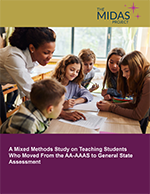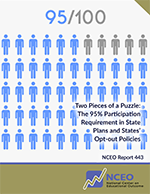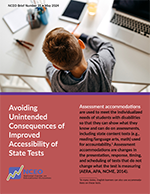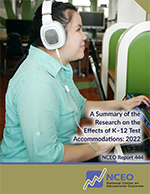Welcome
It’s the season of pumpkin spice latte, fall is in the air, and we have many things to share with you. The first article is about several reports published by a project affiliated with NCEO that share findings of research studies about students who shifted from the alternate assessment to the general assessment. The next article is about how states address the federal requirement that 95% of students participate in state assessments used for accountability. This is followed by an article on the unintended consequences of improved accessibility on state tests, and an article about the accommodations research literature.
Sheryl Lazarus, NCEO Director
MIDAS Project Addresses Needs of Students on the Border Between the Alternate and General Assessments
Historically, some students were inappropriately identified to participate in the alternate assessment based on alternate academic achievement standards (AA-AAAS). States have worked diligently over the past several years to ensure that the right students are participating in the appropriate assessment. When students shift from the alternate assessment to the general assessment, educators sometimes do not know how to confidently provide them with the instruction and support they need.
Two Pieces of a Puzzle: The 95% Participation Requirement in State Plans and States’ Opt-out Policies
The 2015 reauthorization of the Elementary and Secondary Education Act (ESEA), commonly known as the Every Student Succeeds Act (ESSA), limits participation in the alternate assessment based on alternate academic achievement standards (AA-AAAS) to 1% of a state’s tested population. The AA-AAAS is designed for students with the most significant cognitive disabilities. States may submit a waiver request to the U.S. Department of Education if they anticipate exceeding the 1% limit. One eligibility criterion for states seeking a waiver or waiver extension to the 1% cap is to show that at least 95% of all students, as well as 95% of students with disabilities, participated in the required state assessments used for accountability.
Avoiding Unintended Consequences of Improved Accessibility of State Tests
Assessment accommodations are used to meet the individualized needs of students with disabilities so that they can show what they know and can do on national, state, and districtwide assessments. In the past, only accommodations were recognized as a way to increase the accessibility of tests for students with disabilities.
Test Accommodations Research Literature
Research on test accommodations provides valuable information that informs policy and practice. The National Center on Educational Outcomes (NCEO) has reported on accommodations research since 1999. It recently published an update on the accommodations research literature published in 2022 titled A Summary of the Research on the Effects of K-12 Test Accommodations: 2022. This report presents a synthesis of the research literature on testing accommodations for U.S. elementary and secondary students (K–12).
The Center is supported through a Cooperative Agreement (#H326G210002) with the Research to Practice Division, Office of Special Education Programs, U.S. Department of Education. The Center is affiliated with the Institute on Community Integration at the College of Education and Human Development, University of Minnesota. Consistent with EDGAR §75.62, the contents of this report were developed under the Cooperative Agreement from the U.S. Department of Education, but do not necessarily represent the policy or opinions of the U.S. Department of Education or Offices within it. Readers should not assume endorsement by the federal government.
Project Officer: David Egnor




